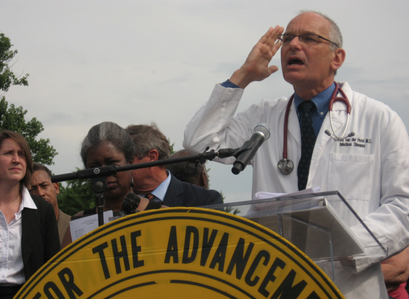|
by Navya Baranwal '20 On May 6, 2013, Dr. Charles van der Horst was arrested by the North Carolina Capitol Police. As a practicing physician and professor in medicine, he never envisioned himself going behind bars. However, he was even more jarred by the fact that he did not see more physicians around him standing up for the rights of patients.
Physicians play a huge role in the physical health of their patients. However, doctors’ roles in the well-being of their patients should run deeper. Beyond biology, a patient’s physical and social health can be influenced by socioeconomic status, access to health care and medications, evolving public policies, and a host of other social determinants of health. As physicians have a unique insight into the health care system, they should be responsible for getting involved and advocating for social change and their patients. Van der Horst’s case shows that any step physicians take to get involved in public policy can be influential. People look to physicians for medical advice; thus, it comes as no surprise that a doctor’s position on a health-related policy issue can influence and inform others. Public health topics such as obesity, health insurance, immunization, tobacco control, and substance abuse are all topics that physicians should voice their beliefs about. Insights of Professionals: After having a discussion with Dr. Bob Hackey, a health policy analyst and professor of Introduction to Public Policy at Brown University and Health Policy and Management at Providence College, I gained a new explanation for why some physicians do not participate in advocacy. Unfortunately, Medicaid patients do not bring in enough money to physicians, so some physicians may not feel motivated to defend the expansion of the program. Other physicians have to constantly find the balance between supporting the views of their publicly-insured patients and privately-insured patients, which may impede them from advocating for any one group. The issue boils down to the problem of collective action, Dr. Hackey said. Many people opt out of collective action because the benefits are uncertain, and results might not even flourish until years later. He proposed that one way to mobilize more physicians would be to increase their membership in interest groups. Every physician might have a different stance on issues, depending on where they practice, the types of patients they treat, and their values. By joining interest groups, physicians would have a platform through which they could learn about different policies as well as take action to showcase their own opinions. Speaking to Dr. Patricia Solga, a pediatric orthopedic surgeon in Providence, Rhode Island, I learned that for many physicians, lack of time is the biggest obstacle for why physicians might not go out to the streets and physically protest. Even when it comes to issues that affect physicians and their colleagues directly, such as the travel ban’s impact on international physicians, the burden of increasing administrative tasks and busy schedules can hinder a physician’s choice to go out and protest bills. However, she believes that physicians can make their marks in many ways. For example, physicians can contact their legislators or even donate money to various organizations that they support, such as Planned Parenthood. Whether it is through sharing views via social media, writing to legislators, or protesting, physician involvement can drastically improve public knowledge of health care issues and even make marks in health policy. In times like this when health care policy is constantly in the hot seat, health care providers--now more than ever--need to spread their voice and take action through political advocacy.
0 Comments
Leave a Reply. |





